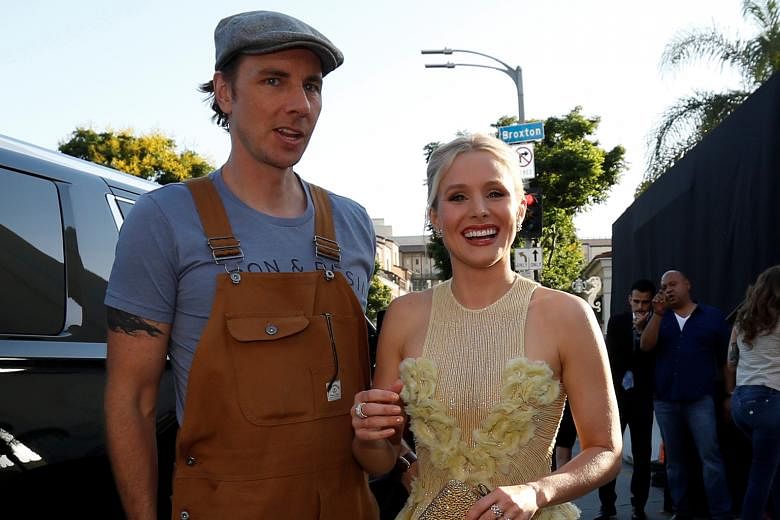NEW YORK • When it came to naming their third son a few weeks ago, actors Megan Fox and Brian Austin Green sidestepped traditional boys' names such as Ethan and Jacob for the gender-agnostic name Journey, which may have been a subtle nod to the couple's much- chronicled attempts to work their way back from the brink of divorce.
Actors Dax Shepard and Kristen Bell also opted for an indeterminate-sex name, Delta, for their second daughter, born last year.
"It was a joke because our first daughter's name is Lincoln, which is very masculine," Shepard said on The Ellen DeGeneres Show. "So a friend of mine teasingly texted me: 'Oh, great! What's this one going to be? Navy Seal? Delta Force?'"
Their choice hardly seems unusual in a culture where model Heidi Klum, TV star Jessica Simpson and actress Drew Barrymore have all chosen names for their daughters that could go either way - Lou, for Klum's daughter, Maxwell, for Simpson's, and Frankie, for Barrymore's.
It is not just Hollywood.
At a time when Banana Republic has done away with pink and blue distinctions in a children's line, some high schools have stopped using graduation gowns with different colours for boys and girls, and unisex is de rigueur in fashion, gender-blurring baby names are on the rise among American parents.
"The old 'Boy Named Sue' idea of a boy being shamed by having a girl's name is passing away," said Ms Pamela Redmond Satran, a founder of the popular baby naming site Nameberry, which attracts five million unique visitors monthly, and last December called "post gender" names - a name given to both boys and girls in roughly equal measure - the hottest trend for this year.
The numbers seem to bear this out. Researchers at Nameberry analysed the baby name registry from the Social Security Administration and found that the number of babies given unisex names such as Harper, Tatum and Quinn had risen 60 per cent in the last decade, to 67,831 babies last year.
The increase was even greater over the last three decades, with the number of unisex baby names having risen 88 per cent since 1985.
Last year, the most popular unisex names, the researchers found, were Hayden (about 39 per cent girls, 61 per cent boys) Charlie (about 48 per cent girls, 52 per cent boys), Emerson (about 60 per cent girls, 40 per cent boys), Rowan (about 35 per cent girls, 65 per cent boys) and Finley (about 60 per cent girls, 40 per cent boys).
Rounding out the post-gender Top 10 were River, Dakota, Skyler, Phoenix and Tatum.
For the purposes of the article, the researchers defined a name as unisex when at least 35 per cent of the babies given it were of one sex, and the rest of the other.
Thirty years ago, for example, Tracy was nearly eight times more common for girls than for boys. Last year, there was a nearly 50-50 split between boys and girls named Tracy, according to United States government data. Similarly, Elliott (in its various spellings) was running almost 100-to-one in favour of boys years ago; last year, about one Elliott in four was a girl.
Other names have seen their gender-specificity eroded more quickly. Boys make up about 38 per cent of children named Tatum, but it was 90 per cent girls a decade ago, according to Social Security records. Haydens are now about 39 per cent girls, up from 11 per cent 10 years ago.
The vogue for unisex names is being driven, in part, by millennials, who are in their 20s and early 30s and in their prime child-bearing years.
"Millennials are an open-minded and accepting group," said Ms Linda Murray, the editor-in-chief of the parenting site BabyCenter, "and they don't want their children to feel pressured to conform to stereotypes that might be restrictive."
NEW YORK TIMES

